【BBC六分钟英语】为什么我们喜欢冒充别人?

【英文脚本】
Alice
Hello and welcome to 6 Minute English. I’m Alice…
Neil
… And I’m Neil.
Alice
Can you do any impersonations, Neil?
Neil
How about this one: My name is Michael Caine. Not a lot of people know that.
Alice
Michael Caine, one of our best loved actors here in Britain. Not bad, Neil. And is a very good way to start today’s show. We are talking about impersonation, or the act of pretending to be somebody else. Why do we like impersonations, Neil?
Neil
Well, sometimes the impersonator is a comedian and doing it to be funny. But another reason is that we get the opportunity to meet people who are no longer with us, like Elvis Presley or Marilyn Monroe. Either way, it helps if it’s a good impersonation.
Alice
Yes, some impersonations are pretty cheesy, and that means bad quality.
Neil
Oh yeah so… huh huh… OK, Alice, I have a question for you!
Alice
Neil, that’s terrible!
Neil
Elvis, please, come on. Can you tell me the name of a musical act that impersonates a famous group? Is it … a) tribute b) tribune Or c) tribunal?
Alice
I’ll go for a) tribute.
Neil
A tribute act? OK, we’ll find out if you got that right later on in the show. But, Alice, don’t you think some impersonators start to believe they really are the personalities they imitate?
Alice
What makes you say that?
Neil
Just think: every time you appear as Elvis Presley, you get fans yelling, ‘Elvis, Elvis, we love you, Elvis!’ And after a while that boundary between you and the real Elvis starts to blur. It must be quite tempting to, you know, pretend that youre the king of rock’n’roll…
Alice
I’m not convinced, Neil. I think Elvis hangs up his wig and moves on. So let’s move on too, and talk about the art of imitation. Here’s British impressionist Jon Culshaw providing some tips on how to imitate, or copy, people.
Jon Culshaw, impressionist
Don’t just say the catchphrase, don’t just say, ‘I am Michael Caine.’ Say a bit more, get some gags going, some conversation going. Notice the things which are worth stretching, which are worth exaggerating to really give you the caricature of that person. It might be a little tic, it might be a little nuance - whatever you notice first really.
Alice
Jon Culshaw, there. What’s a catchphrase, Neil?
Neil
It’s a well-known phrase, often associated with a famous person, like the one I used for Michael Caine earlier on!, Not a lot of people know that. So Jon is saying that it isn’t enough to repeat a catchphrase or use another impersonator’s ideas, you need to think of your own gags, or jokes.
Alice
And you do this by noticing and then exaggerating a person’s tics. A tic is something you do often without realizing you’re doing it, like using certain phrases or gestures, for example, scratching your head. Or in your case, Neil, wiggling your eyebrows.
Neil
Do I wiggle my eyebrows?
Alice
You’re doing it right now! But moving on, there is a serious and very negative side to impersonation. Some impostors, or people who deceive others by pretending to be somebody else, pose as doctors or lawyers, for example.
Neil
You mean without having the qualifications to do the job?
Alice
Exactly, which can have serious consequences, for example pretending to be a doctor with no medical knowledge.
Neil
Like in the film with Leonardo DiCaprio where his character impersonates an airline pilot, a doctor, and a lawyer.
Alice
DiCaprio’s character in the movie Catch Me If You Can is actually based on a real man called Frank Abagnale. Pan Am estimated that in two years Abagnale flew 250 flights to 26 countries.
Neil
OK, let’s listen to Dr Naftali G. Berrill, a forensic psychologist in New York City. He evaluates people for the American government. Here he’s talking about another real case of a woman in the US who was caught pretending to be an attorney, that’s a lawyer.
Dr Naftali G. Berrill, forensic psychologist in New York City
The thing that was most troubling is that because she realized that she was not an attorney and that she was taking people’s money under false pretence, there was no sense of remorse or sense of sadness that she had exploited the people that trusted her. But, you know, in cases where you get these impostors who specifically are pursuing financial gain, they know what they’re doing, but they do it with the shallow conscience of an antisocial personality.
Alice
That was Dr Naftali G. Berrill. What does ‘remorse’ mean, Neil?
Neil
It means being sorry for something you’ve done.
Alice
And our conscience is our inner sense of right or wrong, so a shallow conscience is one that isn’t very deep.
Neil
Antisocial in this context means harmful to other people and to society, although in a general sense, it means not enjoying the company of others.
Alice
OK. Well, I love your company, Neil, as you know. Now, how about the answer to today’s quiz question?
Neil
I asked: What’s the name we use for a band that impersonates a famous group? Is it … a) tribute? b) tribune? Or c) tribunal?
Alice
I said tribute.
Neil
And you were right!
Alice
Hurray!
Neil
Many tribute acts copy the singing style and the appearance of the group as well as playing their music. They often name themselves based on the original band’s name (sometimes with a pun), or on one of their songs or albums. For example, Bjorn Again, a famous Abba tribute band. This name is a pun on ‘Bjorn’, a member of Abba, and the phrase ‘Born Again’, which means to come back to life!
Alice
OK. It’s time to hear the words we learned today. They are: impersonation cheesy imitate catchphrase gags tic impostors conscience shallow antisocial
Neil
Well, that’s the end of today’s 6 Minute English. Please join us again soon! [Imitates Elvis again.]
Alice
Bye bye.
Neil
Elvis is leaving the studio!
【中英文双语脚本】
Alice(爱丽丝)
Hello and welcome to 6 Minute English. I’m Alice…
您好,欢迎来到 6 Minute English。我是 Alice…
Neil(尼尔)
… And I’m Neil.
…我是 Neil。
Alice(爱丽丝)
Can you do any impersonations, Neil?
你能做任何模仿吗,Neil?
Neil(尼尔)
How about this one: My name is Michael Caine. Not a lot of people know that.
这个怎么样:我叫 Michael Caine。没有多少人知道这一点。
Alice(爱丽丝)
Michael Caine, one of our best loved actors here in Britain. Not bad, Neil. And is a very good way to start today’s show. We are talking about impersonation, or the act of pretending to be somebody else. Why do we like impersonations, Neil?
迈克尔·凯恩 (Michael Caine) 是我们在英国最受喜爱的演员之一。不错,尼尔。这是开始今天节目的一个非常好的方式。我们谈论的是冒充,或假装是别人的行为。为什么我们喜欢模仿,Neil?
Neil(尼尔)
Well, sometimes the impersonator is a comedian and doing it to be funny. But another reason is that we get the opportunity to meet people who are no longer with us, like Elvis Presley or Marilyn Monroe. Either way, it helps if it’s a good impersonation.
嗯,有时模仿者是个喜剧演员,这样做是为了搞笑。但另一个原因是我们有机会结识不再与我们在一起的人,例如猫王或玛丽莲梦露。无论哪种方式,如果它是一个好的模仿,都会有所帮助。
Alice(爱丽丝)
Yes, some impersonations are pretty cheesy, and that means bad quality.
是的,有些冒充非常俗气,这意味着质量很差。
Neil(尼尔)
Oh yeah so… huh huh… OK, Alice, I have a question for you!
哦,是的,所以……嗯嗯……好的,Alice,我有一个问题要问你!
Alice(爱丽丝)
Neil, that’s terrible!
尼尔,太可怕了!
Neil(尼尔)
Elvis, please, come on. Can you tell me the name of a musical act that impersonates a famous group? Is it … a) tribute b) tribune Or c) tribunal?
猫王,拜托,来吧。你能告诉我一个冒充著名乐队的音乐表演的名字吗?是吗。。。a) 贡品 b) 论坛还是 c) 法庭?
Alice(爱丽丝)
I’ll go for a) tribute.
我会去 a) 致敬。
Neil(尼尔)
A tribute act? OK, we’ll find out if you got that right later on in the show. But, Alice, don’t you think some impersonators start to believe they really are the personalities they imitate?
致敬行为?好的,我们会在节目后面看看你是否做对了。但是,爱丽丝,你不觉得一些模仿者开始相信他们真的是他们模仿的个性吗?
Alice(爱丽丝)
What makes you say that?
你为什么这么说?
Neil(尼尔)
Just think: every time you appear as Elvis Presley, you get fans yelling, ‘Elvis, Elvis, we love you, Elvis!’ And after a while that boundary between you and the real Elvis starts to blur. It must be quite tempting to, you know, pretend that youre the king of rock’n’roll…
试想一下:每次你以猫王的身份出现时,你都会让粉丝大喊,’猫王,猫王,我们爱你,猫王!过了一段时间,你和真正的猫王之间的界限开始变得模糊。你知道的,假装你是摇滚之王一定很诱人……
Alice(爱丽丝)
I’m not convinced, Neil. I think Elvis hangs up his wig and moves on. So let’s move on too, and talk about the art of imitation. Here’s British impressionist Jon Culshaw providing some tips on how to imitate, or copy, people.
我不相信,尼尔。我认为猫王挂上了他的假发,继续前进。所以,让我们也继续前进,谈谈模仿的艺术。以下是英国印象派画家 Jon Culshaw 提供的一些关于如何模仿或复制人物的技巧。
Jon Culshaw, impressionist(JonCulshaw,印象派画家)
Don’t just say the catchphrase, don’t just say, ‘I am Michael Caine.’ Say a bit more, get some gags going, some conversation going. Notice the things which are worth stretching, which are worth exaggerating to really give you the caricature of that person. It might be a little tic, it might be a little nuance - whatever you notice first really.
不要只说口号,不要只说,’我是迈克尔·凯恩。多说一点,做一些插科打诨,做一些对话。注意那些值得延伸的事情,哪些值得夸大的事情,以真正给你那个人的漫画。它可能有点抽搐,也可能有点细微差别 - 无论你首先注意到什么。
Alice(爱丽丝)
Jon Culshaw, there. What’s a catchphrase, Neil?
乔恩·卡尔肖(Jon Culshaw),在那里。什么是标语,尼尔?
Neil(尼尔)
It’s a well-known phrase, often associated with a famous person, like the one I used for Michael Caine earlier on!, Not a lot of people know that. So Jon is saying that it isn’t enough to repeat a catchphrase or use another impersonator’s ideas, you need to think of your own gags, or jokes.
这是一个众所周知的短语,经常与名人联系在一起,就像我之前对 Michael Caine 使用的那个!,没有多少人知道。所以 Jon 的意思是,仅仅重复一个标语或使用另一个模仿者的想法是不够的,你需要考虑你自己的笑话或笑话。
Alice(爱丽丝)
And you do this by noticing and then exaggerating a person’s tics. A tic is something you do often without realizing you’re doing it, like using certain phrases or gestures, for example, scratching your head. Or in your case, Neil, wiggling your eyebrows.
你通过注意到然后夸大一个人的抽搐来做到这一点。抽动是您经常在不知情的情况下做的事情,例如使用某些短语或手势,例如,挠头。或者,就你而言,Neil 扭动着你的眉毛。
Neil(尼尔)
Do I wiggle my eyebrows?
我是否会扭动眉毛?
Alice(爱丽丝)
You’re doing it right now! But moving on, there is a serious and very negative side to impersonation. Some impostors, or people who deceive others by pretending to be somebody else, pose as doctors or lawyers, for example.
你现在正在做!但继续前进,冒充也有严重且非常消极的一面。例如,一些冒名顶替者,或者通过伪装成别人来欺骗他人的人,冒充医生或律师。
Neil(尼尔)
You mean without having the qualifications to do the job?
你的意思是没有资格做这份工作?
Alice(爱丽丝)
Exactly, which can have serious consequences, for example pretending to be a doctor with no medical knowledge.
没错,这可能会产生严重的后果,例如假装是没有医学知识的医生。
Neil(尼尔)
Like in the film with Leonardo DiCaprio where his character impersonates an airline pilot, a doctor, and a lawyer.
就像在莱昂纳多·迪卡普里奥 (Leonardo DiCaprio) 的电影中,他的角色冒充航空公司飞行员、医生和律师。
Alice(爱丽丝)
DiCaprio’s character in the movie Catch Me If You Can is actually based on a real man called Frank Abagnale. Pan Am estimated that in two years Abagnale flew 250 flights to 26 countries.
迪卡普里奥在电影《如果可以就抓住我》中的角色实际上是基于一个名叫弗兰克·阿巴尼亚莱的真实男人。泛美航空公司估计,在两年内,Abagnale 飞往 26 个国家/地区,共飞行了 250 次航班。
Neil(尼尔)
OK, let’s listen to Dr Naftali G. Berrill, a forensic psychologist in New York City. He evaluates people for the American government. Here he’s talking about another real case of a woman in the US who was caught pretending to be an attorney, that’s a lawyer.
好的,让我们听听纽约市的法医心理学家 Naftali G. Berrill 博士的演讲。他为美国政府评估人员。在这里,他谈论的是另一个真实的案例,一位美国女性被抓到假装是律师,那就是一名律师。
Dr Naftali G. Berrill, forensic psychologist in New York City(NaftaliG.Berrill博士,纽约市法医心理学家)
The thing that was most troubling is that because she realized that she was not an attorney and that she was taking people’s money under false pretence, there was no sense of remorse or sense of sadness that she had exploited the people that trusted her. But, you know, in cases where you get these impostors who specifically are pursuing financial gain, they know what they’re doing, but they do it with the shallow conscience of an antisocial personality.
最令人不安的是,因为她意识到自己不是律师,而且她以虚假的借口拿走了人们的钱,所以没有因为她剥削了信任她的人而感到懊悔或悲伤。但是,你知道,如果你遇到这些专门追求经济利益的冒名顶替者,他们知道自己在做什么,但他们是带着反社会人格的肤浅良心来做的。
Alice(爱丽丝)
That was Dr Naftali G. Berrill. What does ‘remorse’ mean, Neil?
那是 Naftali G. Berrill 博士。尼尔,“懊悔”是什么意思?
Neil(尼尔)
It means being sorry for something you’ve done.
这意味着对你所做的事感到抱歉。
Alice(爱丽丝)
And our conscience is our inner sense of right or wrong, so a shallow conscience is one that isn’t very deep.
我们的良心是我们内在的对或错感,所以肤浅的良心不是很深。
Neil(尼尔)
Antisocial in this context means harmful to other people and to society, although in a general sense, it means not enjoying the company of others.
在这种情况下,反社会意味着对他人和社会有害,尽管在一般意义上,这意味着不喜欢他人的陪伴。
Alice(爱丽丝)
OK. Well, I love your company, Neil, as you know. Now, how about the answer to today’s quiz question?
还行。嗯,我爱你的陪伴,Neil,你知道的。那么,今天的测验问题的答案怎么样?
Neil(尼尔)
I asked: What’s the name we use for a band that impersonates a famous group? Is it … a) tribute? b) tribune? Or c) tribunal?
我问:我们用什么名字来称呼冒充著名乐队的乐队?是吗。。。a) 致敬?b) 论坛报?或 c) 法庭?
Alice(爱丽丝)
I said tribute.
我说致敬。
Neil(尼尔)
And you were right!
你是对的!
Alice(爱丽丝)
Hurray!
万岁!
Neil(尼尔)
Many tribute acts copy the singing style and the appearance of the group as well as playing their music. They often name themselves based on the original band’s name (sometimes with a pun), or on one of their songs or albums. For example, Bjorn Again, a famous Abba tribute band. This name is a pun on ‘Bjorn’, a member of Abba, and the phrase ‘Born Again’, which means to come back to life!
许多致敬表演者在演奏他们的音乐的同时,也复制了乐队的演唱风格和外表。他们经常根据原始乐队的名字(有时带有双关语)或他们的一首歌曲或专辑来命名自己。例如,著名的 Abba 致敬乐队 Bjorn Again。这个名字是 Abba 成员“Bjorn”的双关语,以及短语“Born Again”,意思是复活!
Alice(爱丽丝)
OK. It’s time to hear the words we learned today. They are: impersonation cheesy imitate catchphrase gags tic impostors conscience shallow antisocial
还行。是时候听听我们今天学到的文字了。他们是: 冒名顶替 俗气 模仿 流行语 插科打诨 抽搐 冒名顶替者 良心 肤浅 反社会
Neil(尼尔)
Well, that’s the end of today’s 6 Minute English. Please join us again soon! [Imitates Elvis again.]
好了,今天的六分钟 English 到此结束。请尽快再次加入我们
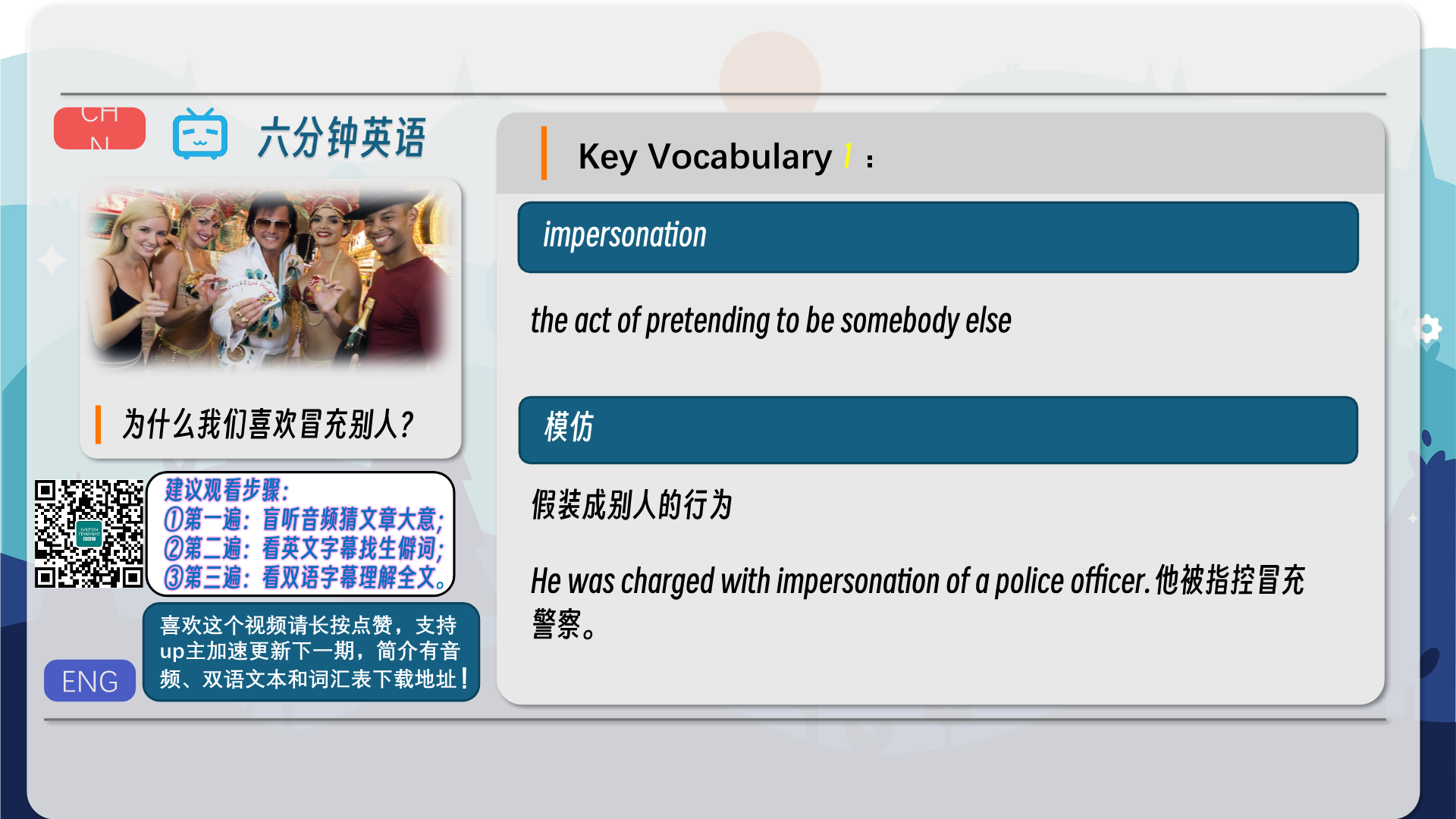
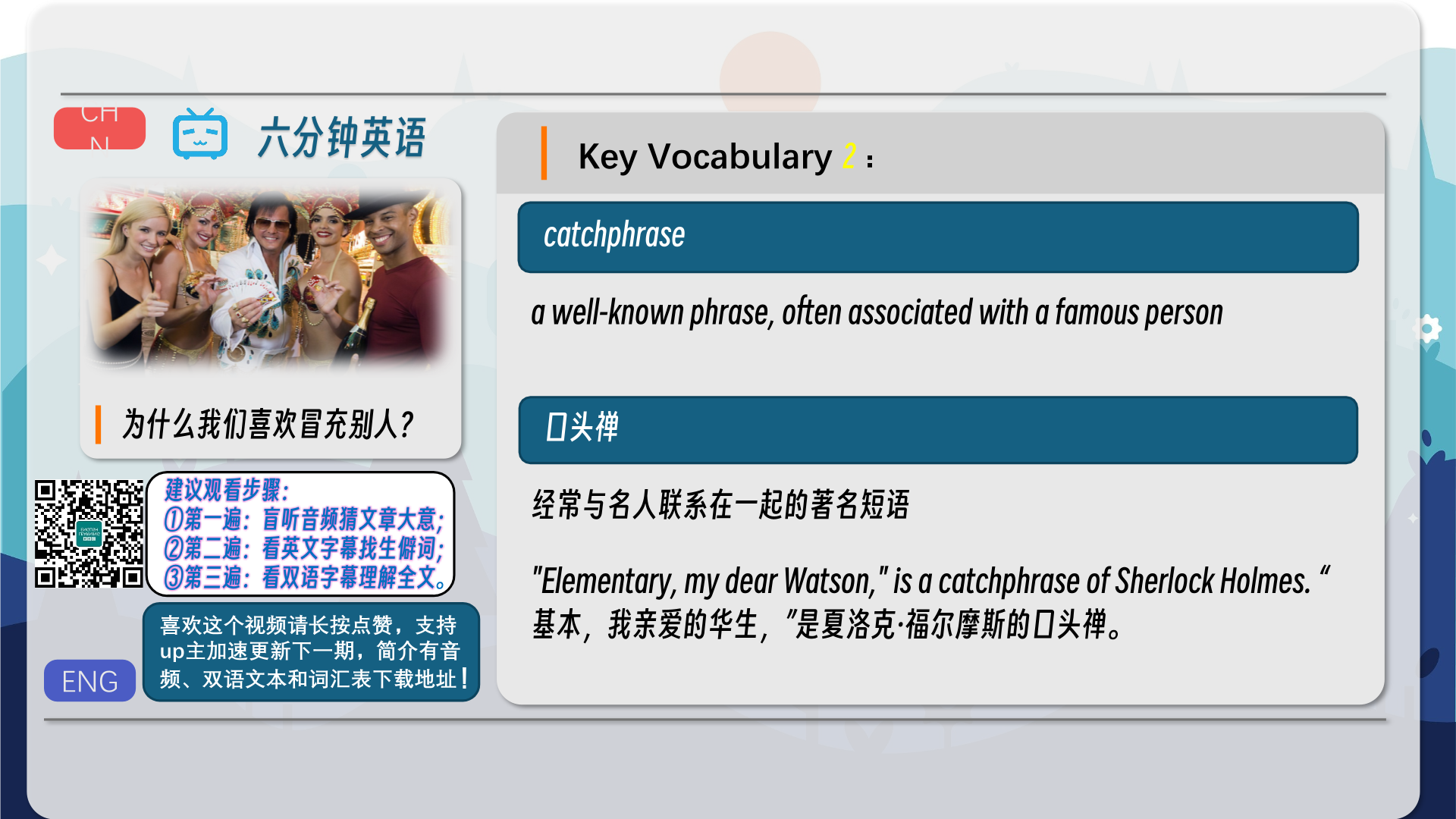
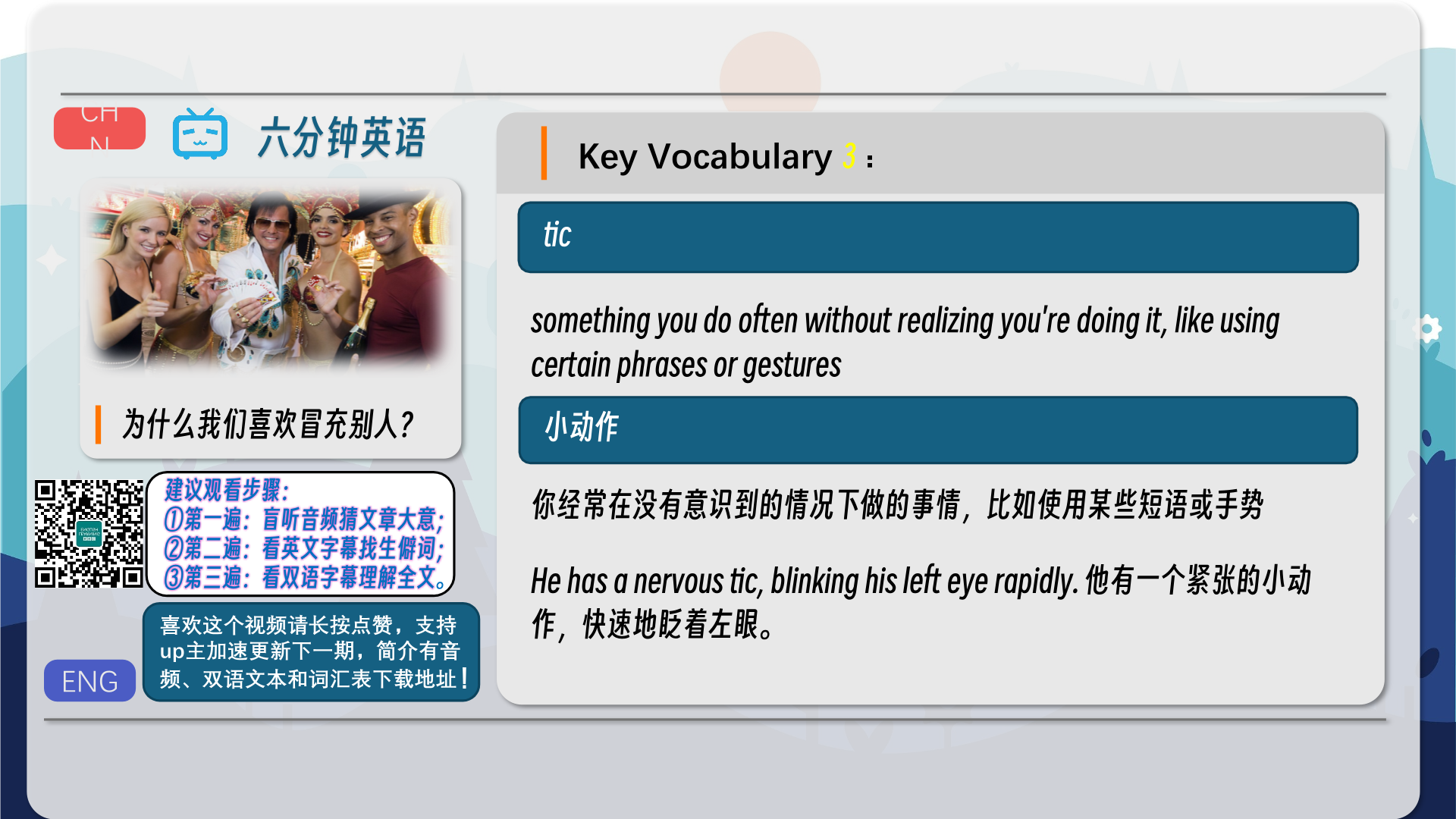
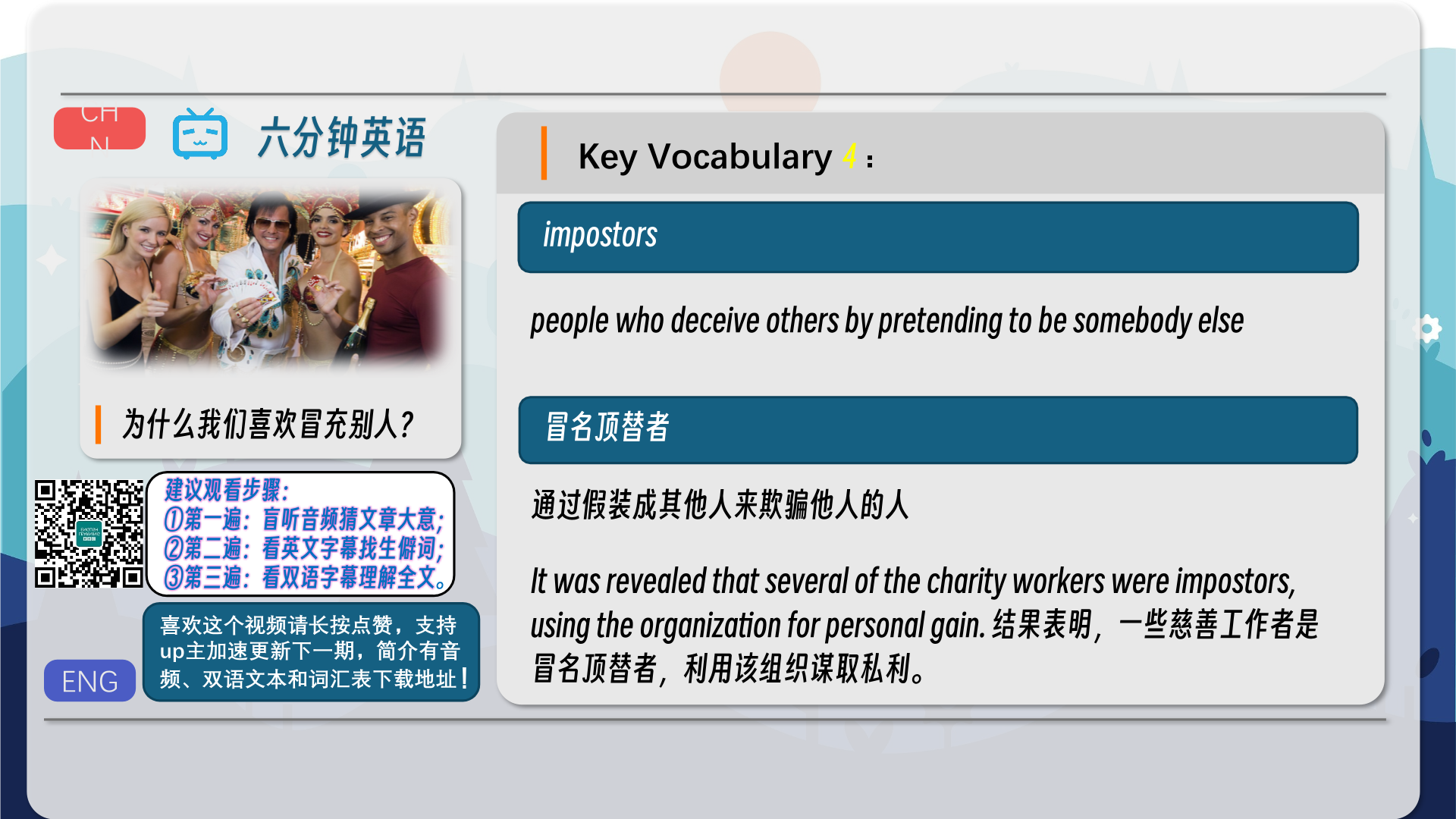
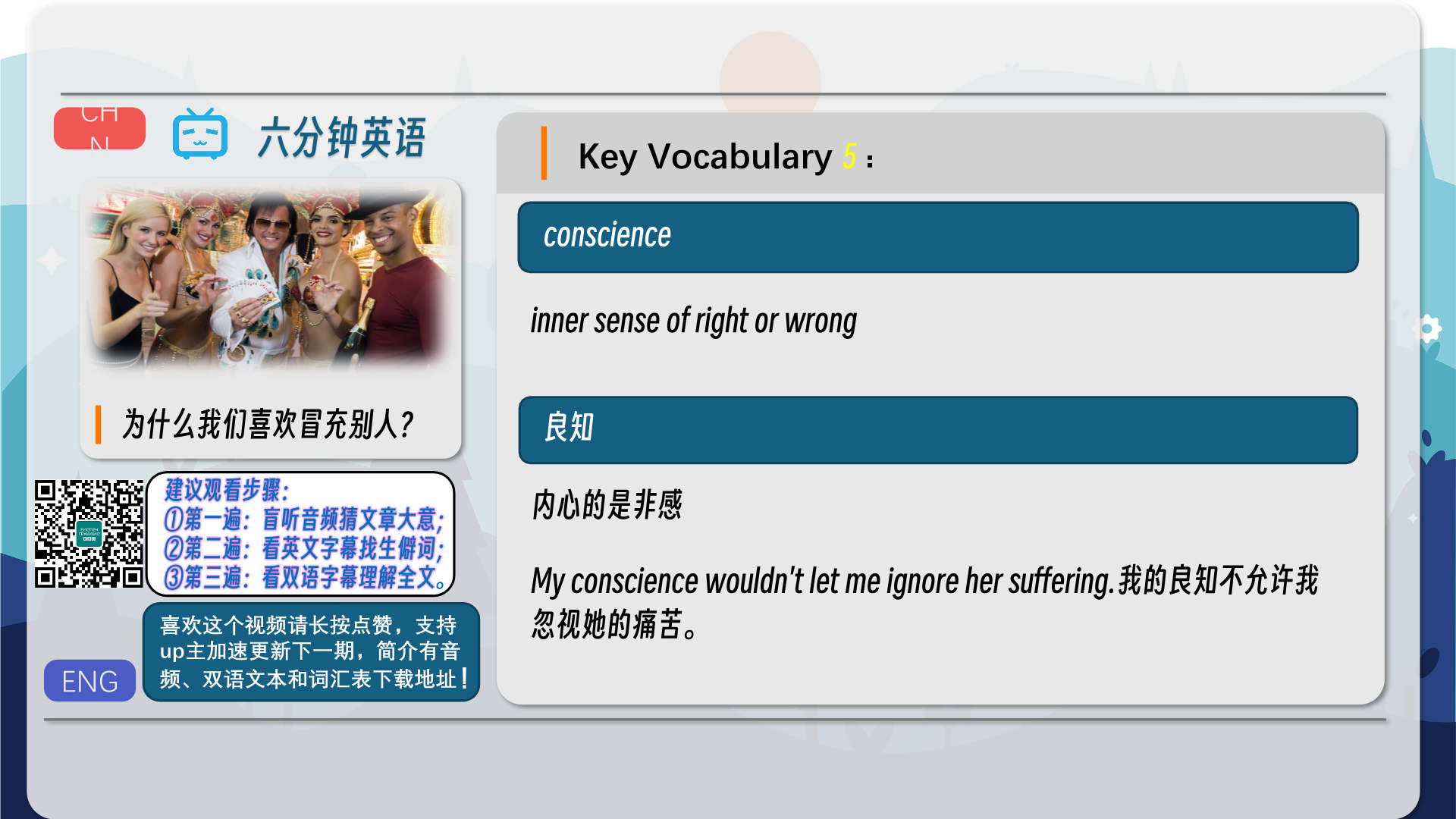
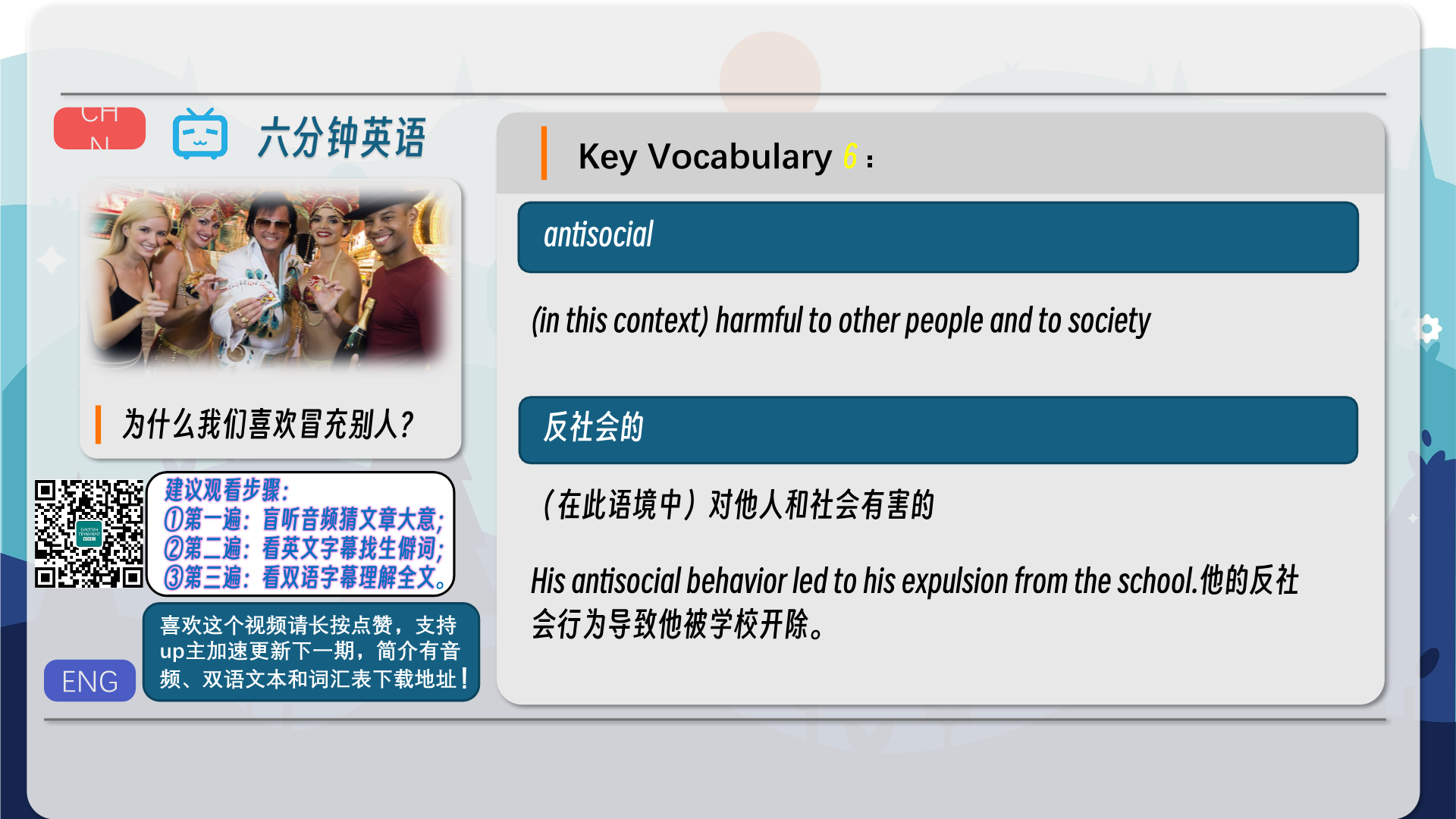
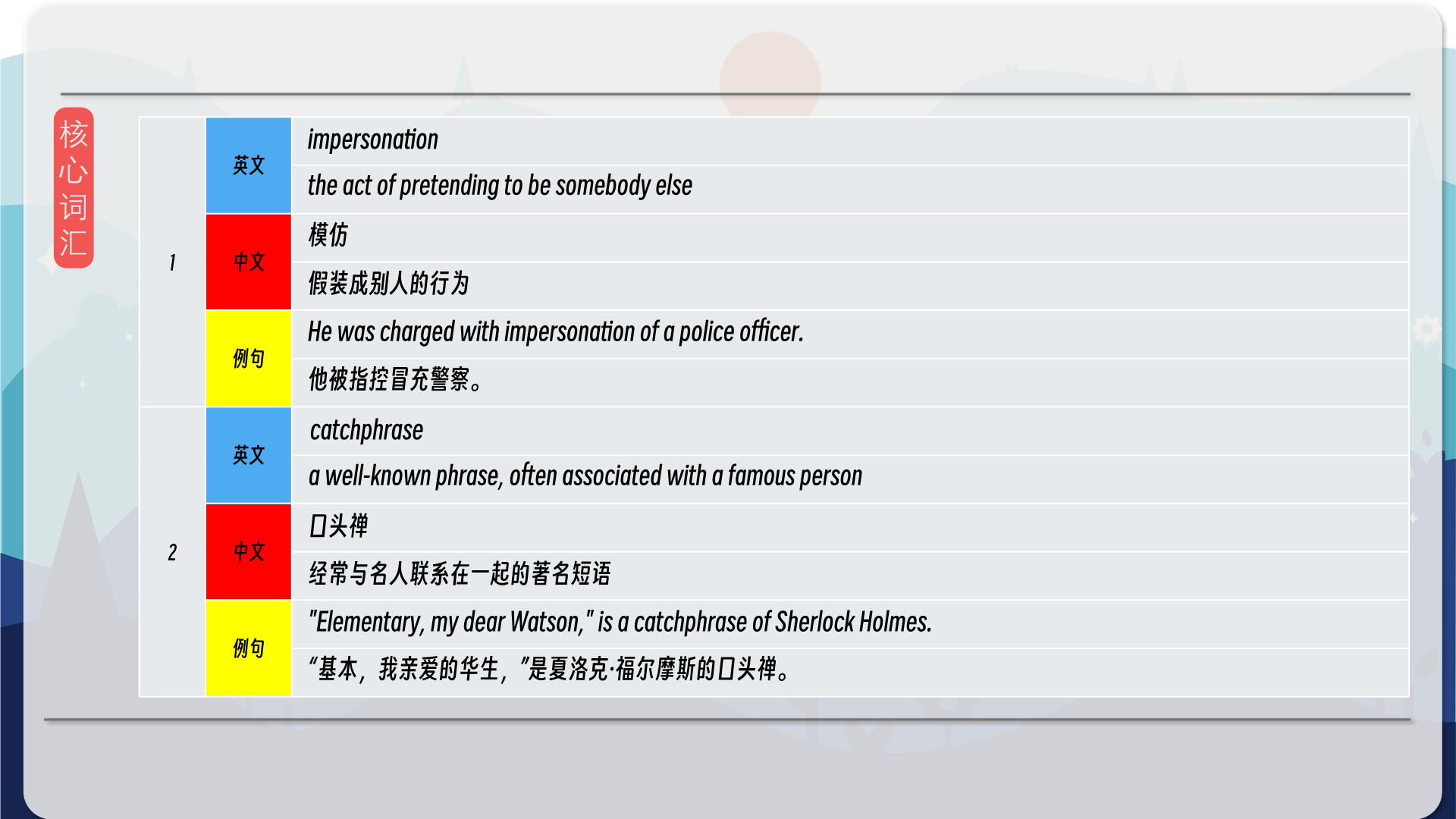
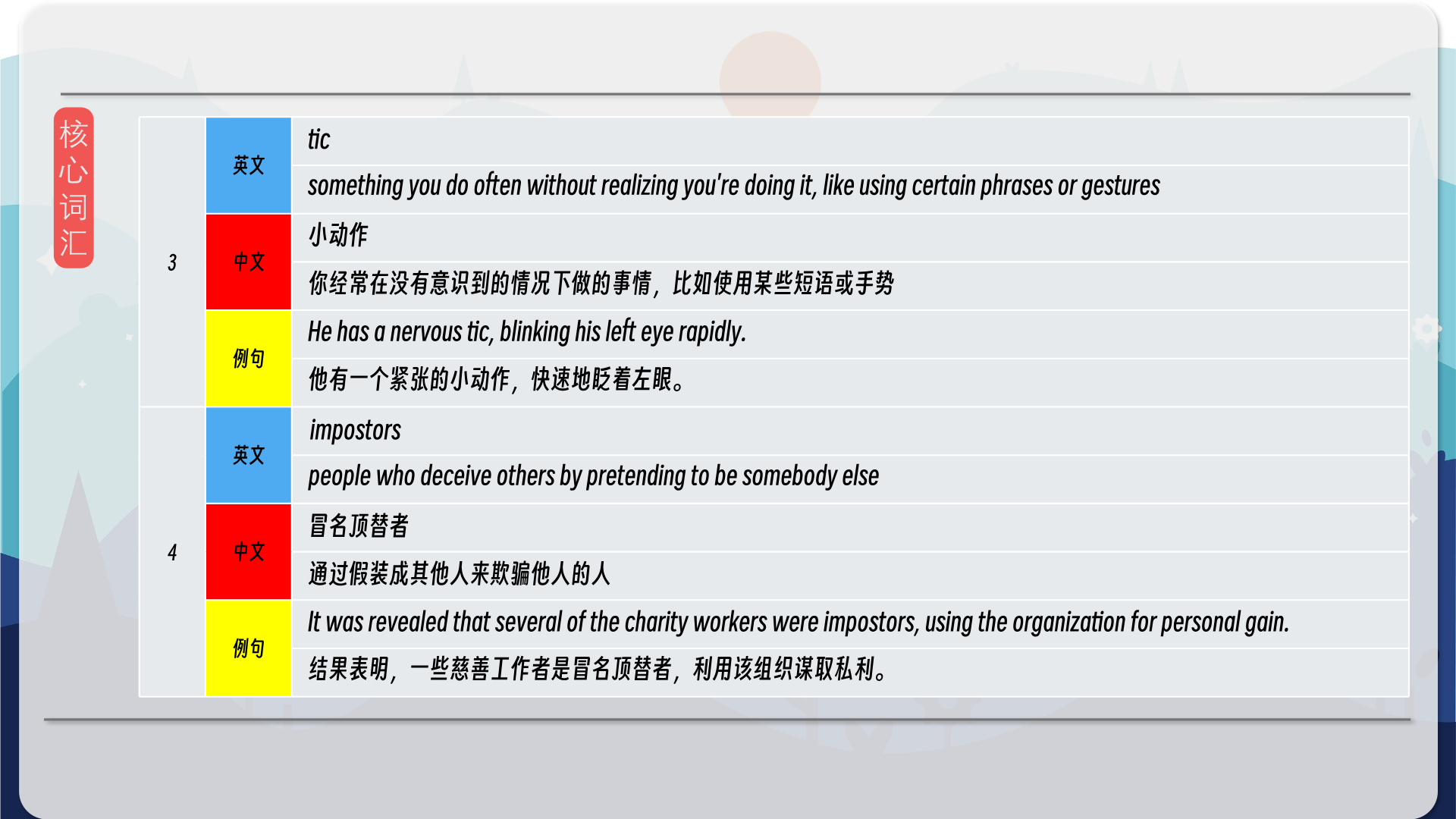
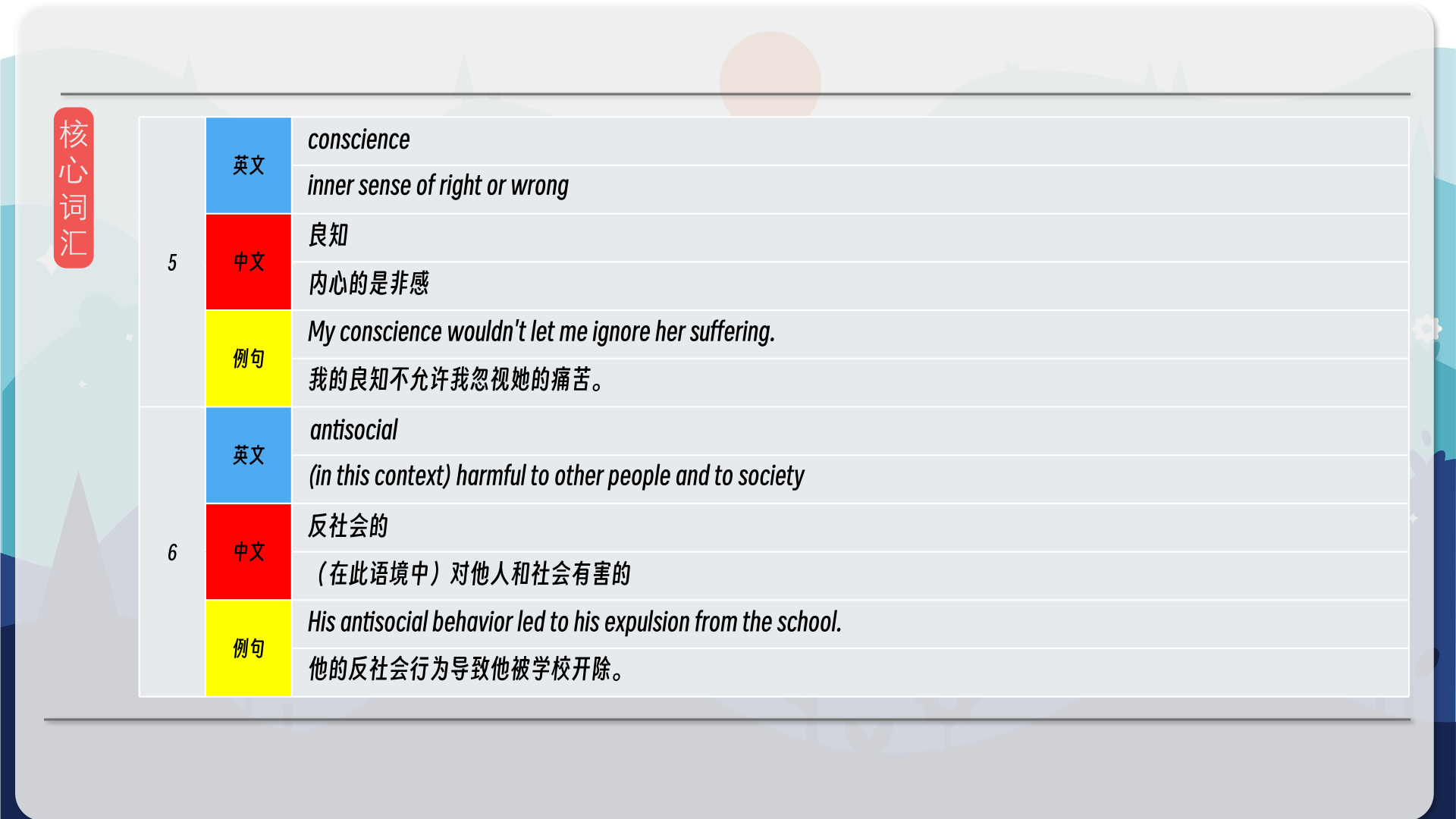
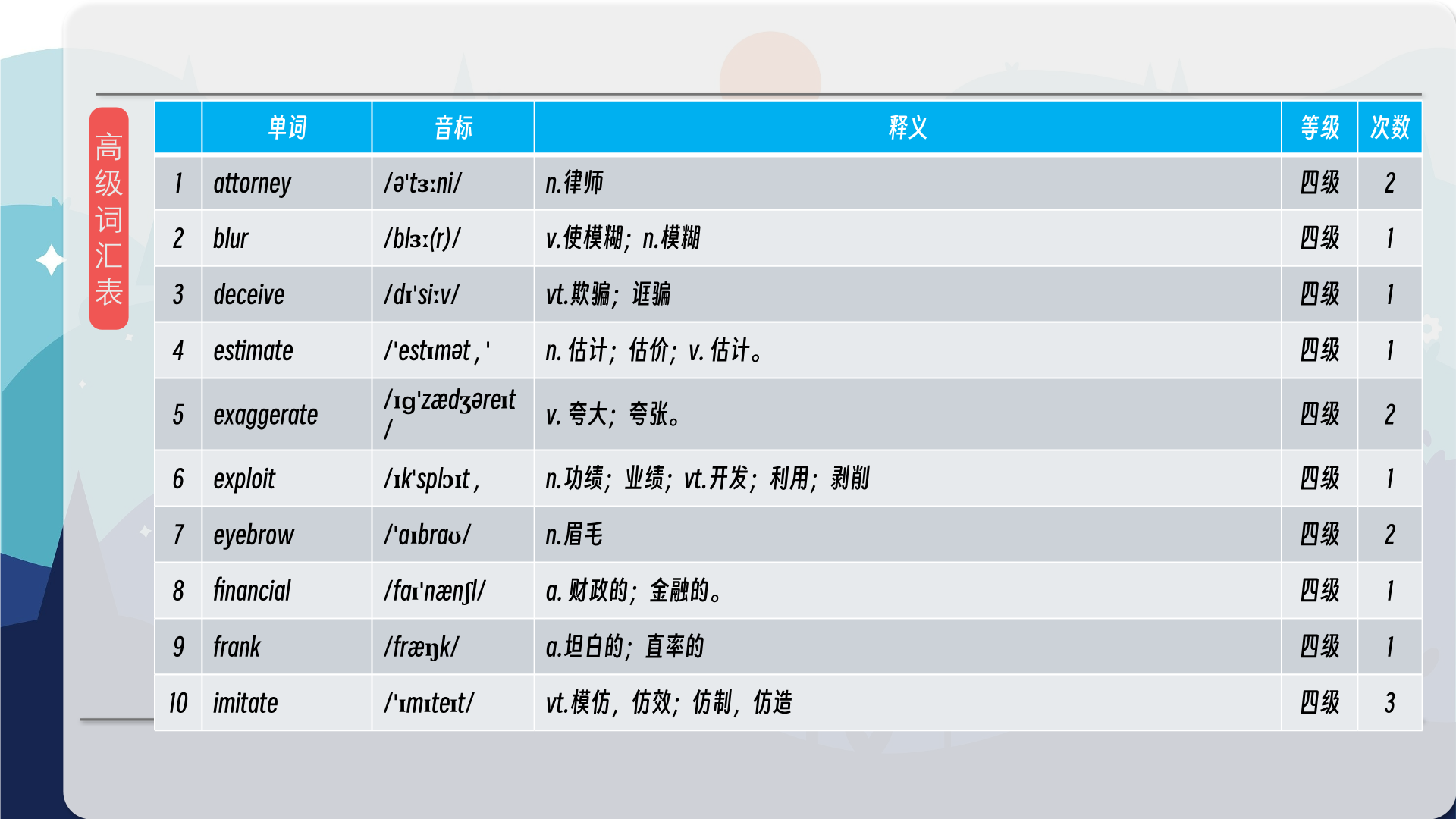
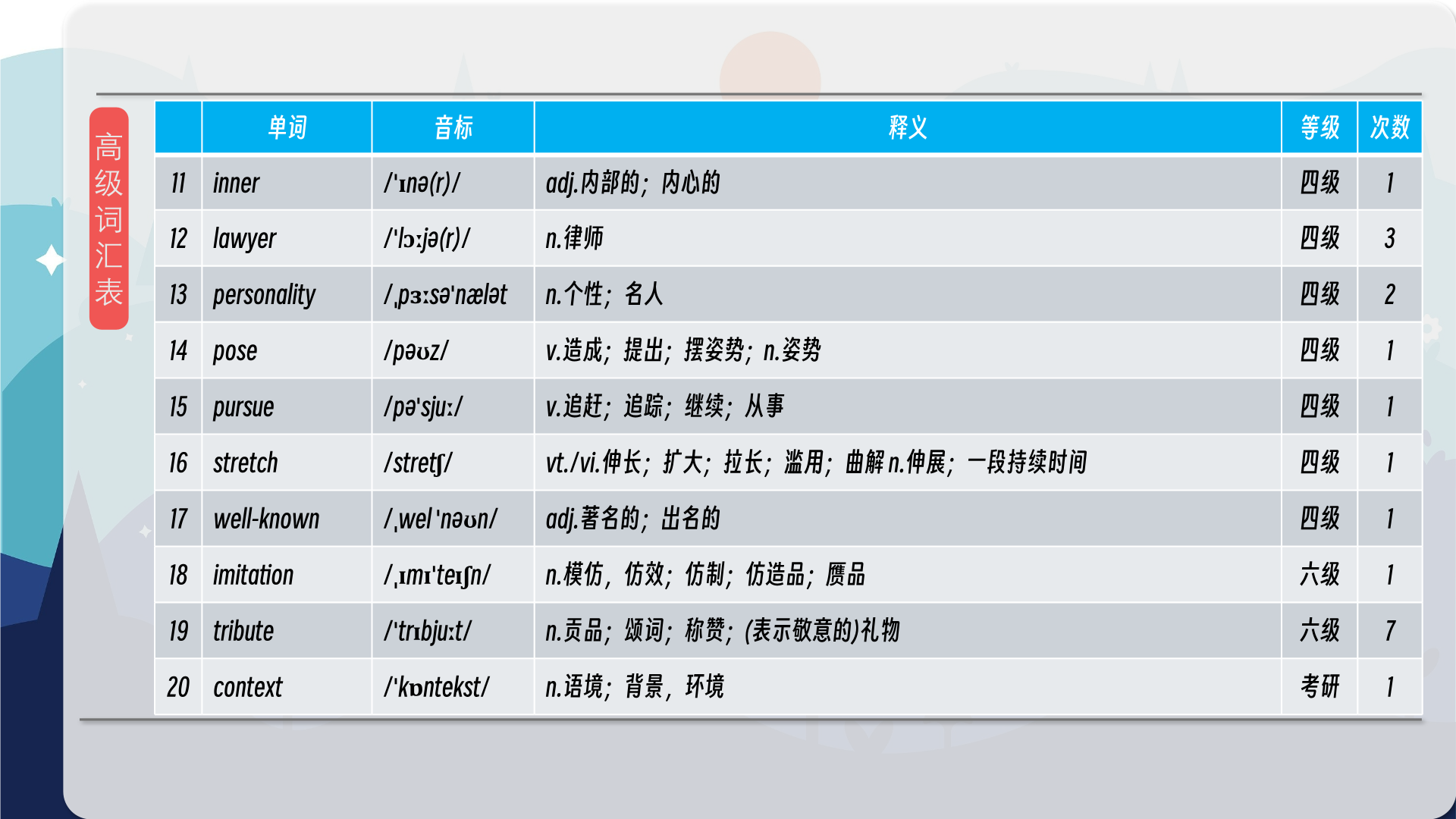
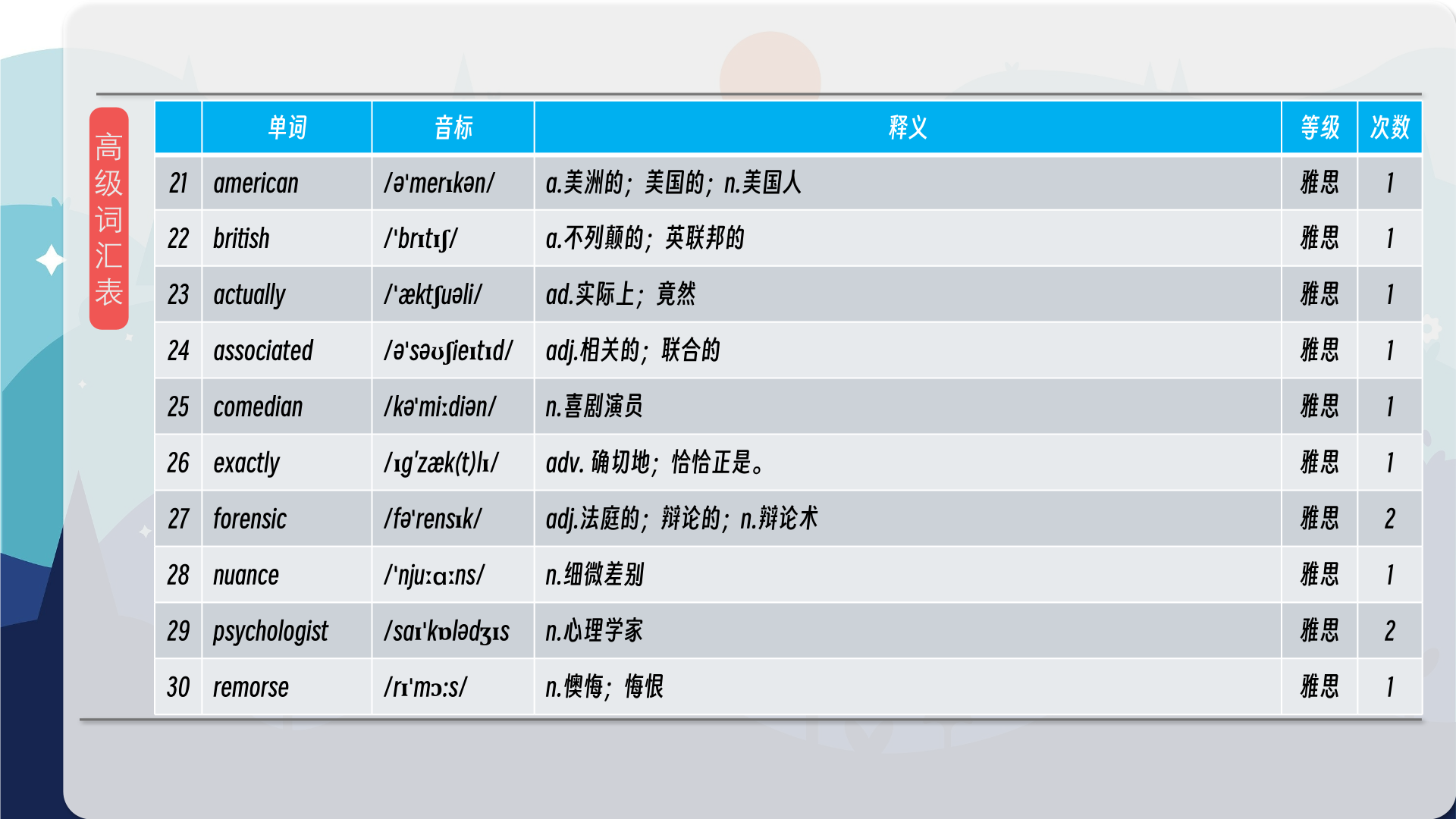


【核心词汇】
impersonation
the act of pretending to be somebody else
模仿
假装成别人的行为
He was charged with impersonation of a police officer.
他被指控冒充警察。
catchphrase
a well-known phrase, often associated with a famous person
口头禅
经常与名人联系在一起的著名短语
“Elementary, my dear Watson,” is a catchphrase of Sherlock Holmes.
“基本,我亲爱的华生,”是夏洛克·福尔摩斯的口头禅。
tic
something you do often without realizing you’re doing it, like using certain phrases or gestures
小动作
你经常在没有意识到的情况下做的事情,比如使用某些短语或手势
He has a nervous tic, blinking his left eye rapidly.
他有一个紧张的小动作,快速地眨着左眼。
impostors
people who deceive others by pretending to be somebody else
冒名顶替者
通过假装成其他人来欺骗他人的人
It was revealed that several of the charity workers were impostors, using the organization for personal gain.
结果表明,一些慈善工作者是冒名顶替者,利用该组织谋取私利。
conscience
inner sense of right or wrong
良知
内心的是非感
My conscience wouldn’t let me ignore her suffering.
我的良知不允许我忽视她的痛苦。
antisocial
(in this context) harmful to other people and to society
反社会的
(在此语境中)对他人和社会有害的
His antisocial behavior led to his expulsion from the school.
他的反社会行为导致他被学校开除。
在公众号里输入6位数字,获取【对话音频、英文文本、中文翻译、核心词汇和高级词汇表】电子档,6位数字【暗号】在文章的最后一张图片,如【220728】,表示22年7月28日这一期。公众号没有的文章说明还没有制作相关资料。年度合集在B站【六分钟英语】工房获取,每年共计300+文档,感谢支持!